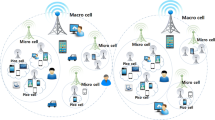Abstract
The fifth-generation (5G) mobile communication system is expecting to support users with diverse data rate requirements by densely deploying small cells. The users attached with small cells make use of the same frequency band as the existing macro cell users, that causes severe co-channel interference and degrades the performance. To overcome this challenge, we propose a game theoretical framework for the optimal uplink power allocation for small cells, i.e., femtocell deployed underlaid macrocell. In this paper, femtocell users play a non-cooperative game to choose the optimal power to maximize the sum-rate of the system. Furthermore, an iterative quality-of-service (QoS)-aware game theory based power control (QoS-GTPC) scheme is proposed to optimize the femtocell user power taking into account macrocell user QoS requirements. Simulation results verify that the proposed QoS-GTPC scheme significantly improves the sum-rate and reduces outage and interference, as compared with conventional power control scheme.





Similar content being viewed by others
References
Vo NS, Duong TQ, Tuan HD, Kortun A (2017) Optimal video streaming in dense 5G networks with D2D communications. IEEE Access
Andrews JG, Buzzi S, Choi W, Hanly SV, Lozano A, Soong AC, Zhang JC (2014) What will 5G be? IEEE J Sel Areas Commun 32(6):1065
Monserrat JF, Mange G, Braun V, Tullberg H, Zimmermann G, Bulakci Ö (2015) METIS research advances towards the 5G mobile and wireless system definition. EURASIP J Wirel Commun Netw 2015 (1):1
Ge X, Tu S, Mao G, Wang CX, Han T (2016) 5G ultra-dense cellular networks. IEEE Wire Commun 23(1):72
Nguyen NP, Duong TQ, Ngo HQ, Hadzi-Velkov Z, Shu L (2016) Secure 5G wireless communications: A joint relay selection and wireless power transfer approach. IEEE Access 4:3349
Tehrani MN, Uysal M, Yanikomeroglu H (2014) Device-to-device communication in 5G cellular networks: challenges, solutions, and future directions. IEEE Commun Mag 52(5):86
Kaleem Z, Li Y, Chang K (2016) Public safety users priority-based energy and time-efficient device discovery scheme with contention resolution for ProSe in 3GPP LTE-A systems. IET Commun 10(15):1873
Huynh DT, Wang X, Duong TQ, Vo NS, Chen M (2018) Social-aware energy efficiency optimization for device-to-device communications in 5G networks. Comput Commun
Lee CH, Lee SH, Go KC, Oh SM, Shin JS, Kim JH (2015) Mobile small cells for further enhanced 5G heterogeneous networks. ETRI J 37(5):856
Chen W, Ahmad I, Chang K (2017) Co-channel interference management using eICIC/FeICIC with coordinated scheduling for the coexistence of PS-LTE and LTE-R networks. EURASIP J Wirel Commun Netw 2017 (1):1
Kaleem Z, Khaliq MZ, Khan A, Ahmad I, Duong TQ (2018) PS-CARA: context-aware resource allocation scheme for mobile public safety networks. Sensors 18(5):1473
Rappaport TS, Sun S, Mayzus R, Zhao H, Azar Y, Wang K, Wong GN, Schulz JK, Samimi M, Gutierrez F (2013) Millimeter wave mobile communications for 5G cellular: it will work! IEEE Access 1:335
Kaleem Z, Chang K (2018) QoS priority-based coordinated scheduling and hybrid spectrum access for femtocells in dense cooperative 5G cellular networks. Trans Emerging Tel Tech 29(1)
Kaleem Z, Hui B, Chang K (2014) QoS priority-based dynamic frequency band allocation algorithm for load balancing and interference avoidance in 3GPP LTE HetNet. EURASIP J Wire Commun Networ 2014(1):1
Mao T, Feng G, Liang L, Qin S, Wu B (2016) Distributed energy-efficient power control for macro–femto networks. IEEE Trans Veh Technol 65(2):718
Kaleem Z, Ahmad A, Rehmani MH (2017) Neighbors’ interference situation-aware power control scheme for dense 5G mobile communication system. Telecommun Syst, 1–8
Kim W, Kaleem Z, Chang K (2015) Power headroom report-based uplink power control in 3GPP LTE-A HetNet. EURASIP J Wireless Com Netw 2015(1):1
Munir H, Hassan SA, Pervaiz H, Ni Q (2016) A game theoretical network-assisted user-centric design for resource allocation in 5G heterogeneous networks. In: Vehicular technology conference (VTC Spring). IEEE, pp 1–5
Kim W, Kaleem Z, Chang K (2015) UE-specific interference-aware open-loop power control in 3GPP LTE-A uplink HetNet. In: IEEE Seventh international conference on ubiquitous and future networks, pp 682–684
Sampaio LDH, Abrao T, Durand FR (2017) Game theory based resource allocation in multi-cell massive MIMO OFDMA networks. In: Wireless communications and networking conference (WCNC). IEEE, pp 1–6
Maaz B, Khawam K, Tohme S, Lahoud S, Nasreddine J (2017) Joint user association, power control and scheduling in multi-cell 5G networks. In: Wireless communications and networking conference (WCNC). IEEE, pp 1–6
Kang K, Pan Z, Liu J, Shimamoto S (2017) A game theory based power control algorithm for future MTC NOMA networks. In: Consumer communications & networking conference (CCNC). IEEE, pp 203–208
Poulkov V, Koleva P, Asenov O, Iliev G (2014) Combined power and inter-cell interference control for LTE based on role game approach. Telecommun Syst 55(4):481
Han Q, Yang B, Wang X, Ma K, Chen C, Guan X (2014) Hierarchical-game-based uplink power control in femtocell networks. IEEE Trans Veh Technol 63(6):2819
Kang X, Zhang R, Motani M (2012) Price-based resource allocation for spectrum-sharing femtocell networks: a stackelberg game approach. IEEE J Sel Areas Commun 30(3):538
Li W, Zhang H, Zheng W, Su T, Wen X (2012) Energy-efficient power allocation with dual-utility in two-tier OFDMA femtocell networks. In: Globecom workshops (GC Wkshps). IEEE, pp 535–540
Li M, Chen P, Gao S (2016) Cooperative game-based energy efficiency management over ultra-dense wireless cellular networks. Sensors 16(9):1475
ITU. Guidelines for evaluation of radio transmission technologies for imt-2000 systems (1998)
Acknowledgements
The work of L. D. Nguyen and D.-B. Ha was supported by a Research Environment Links grant, ID 339568416, under the Newton Programme Vietnam partnership. The grant is funded by the UK Department of Business, Energy and Industrial Strategy (BEIS) and delivered by the British Council. For further information, please visit www.newtonfund.ac.uk./ and also supported by Start Up Research Grant (SRGP) Project No. 1137 from Higher Education Commission (HEC) of Pakistan.
Author information
Authors and Affiliations
Corresponding author
Rights and permissions
About this article
Cite this article
Ahmad, I., Kaleem, Z., Narmeen, R. et al. Quality-of-Service Aware Game Theory-Based Uplink Power Control for 5G Heterogeneous Networks. Mobile Netw Appl 24, 556–563 (2019). https://doi.org/10.1007/s11036-018-1156-2
Published:
Issue Date:
DOI: https://doi.org/10.1007/s11036-018-1156-2




